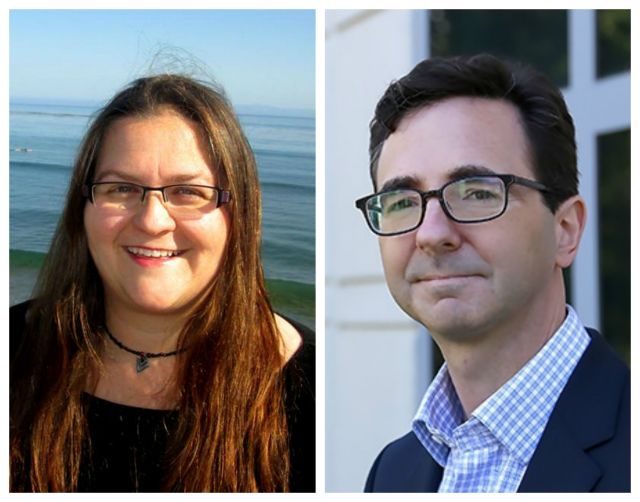Megan Valentine and Michael Chabinyc are elected fellows of the American Physical Society

On September 19, 2019, both Megan Valentine and Michael Chabinyc were elected fellows of the American Physical Society. The ICB is proud to have both of them as project leaders in the ICB's Bio-Enabled Materials research group. They have been recognized by their peers for their “exceptional contributions to the physics enterprise in physics research, important applications of physics, leadership in or service to physics, or significant contributions to physics education,” they join 166 fellow scientists and engineers “selected and recognized for their contributions to science.”
“The American Physical Society is the premier society for biological and biomaterial physics and being selected as a fellow includes me among the leaders in the field, which is truly inspiring,” said Megan, a professor of Mechanical Engineering and associate director of the California NanoSystems Institute at UCSB. “It is both an honor and a goal I set at the beginning of my career. The fact that I was elected one year after attaining full professorship at UCSB demonstrates the impact of my work. This honor further motivates me to continue pushing boundaries, pursuing interdisciplinary collaborations and taking risks.”
Valentine's research focuses on understanding how forces are generated and transmitted in living materials and how they control cellular outcomes. She also examines how to capture and mimic, in manmade materials, the extraordinary features of living systems, including the ability to respond, move and heal. Her work to advance the understanding of fundamental biological processes could enable better disease diagnostics and treatments and inspire the creation of high-performance materials used in coatings, packaging and robotics.
Selected by APS’s Division of Biological Physics, Valentine was cited for her “pioneering research in the development of microrheology and the applications of biomechanics at multiple length scales to diverse biological systems.
Michael Chabinyc, chair of UCSB’s Materials Department, studies how to make electronic devices from polymers that conduct electricity. These materials can be printed from solvents, like an ink, to produce flexible transistors and solar cells. By using X-rays and electron microscopy to study how these polymers pack together at the nanoscale, Chabinyc develops new rules for structural design of these functional materials.
He was recognized by the Division of Polymer Physics and cited for “contributions to the understanding of relationships between structure and electronic properties of conjugated polymers, and the translation of these relationships to functional devices such as transistors and solar cells.
“I am honored to be selected,” said Chabinyc, who was named a Materials Research Society fellow earlier this year. “I believe the selection of multiple faculty who study synthetic polymers and biopolymers recognizes the strength of UC Santa Barbara in soft materials.”
Original story written by Andrew Masuda and Sonia Fernandez. Content may be edited for style and length.
